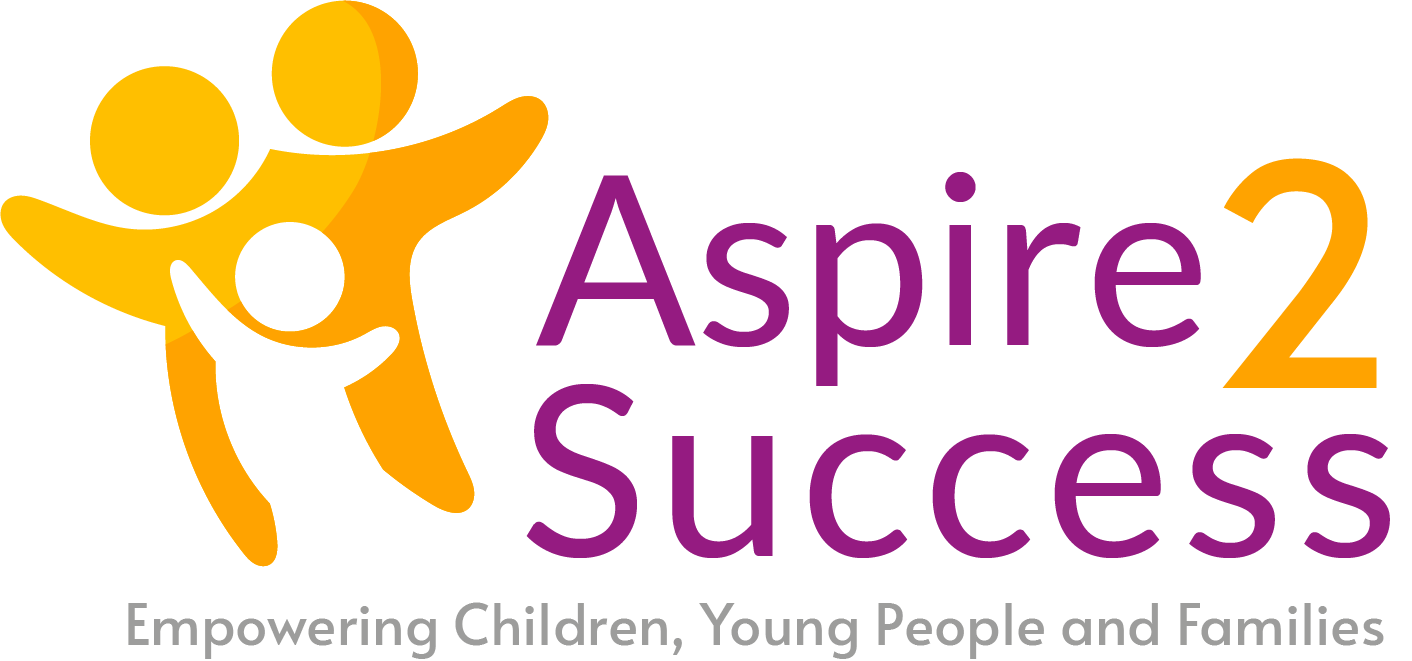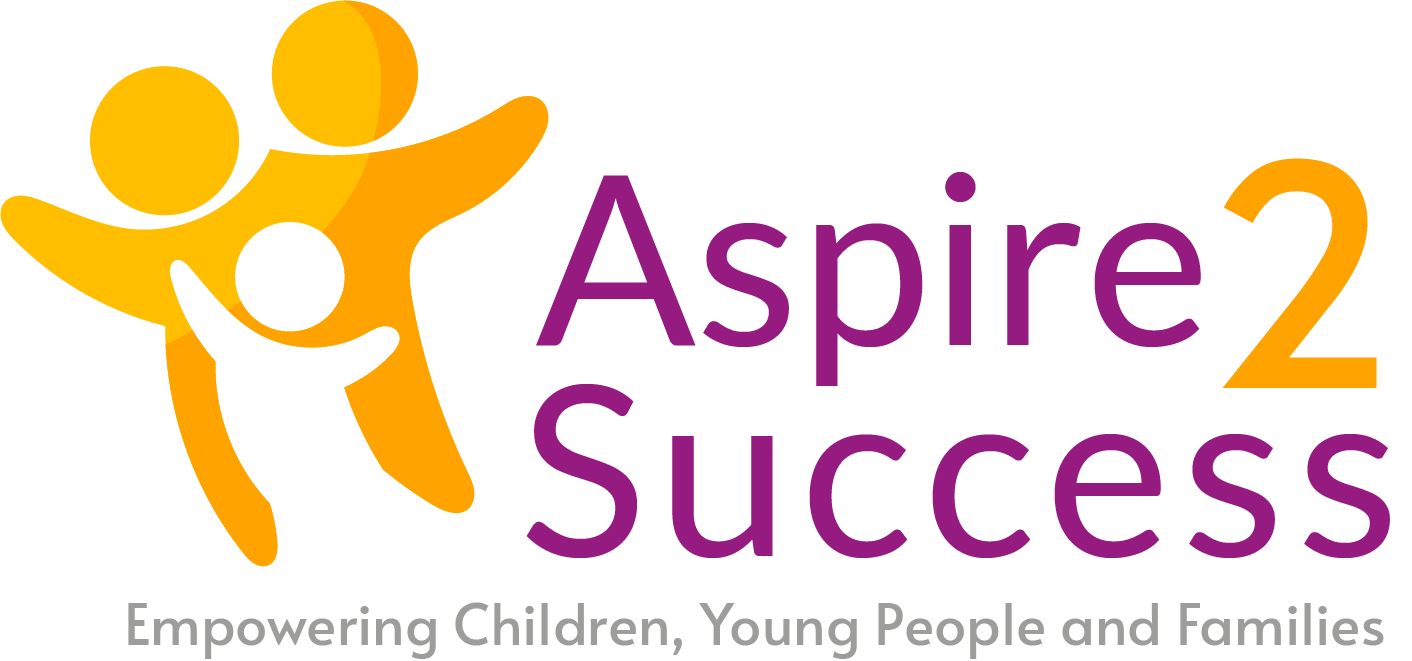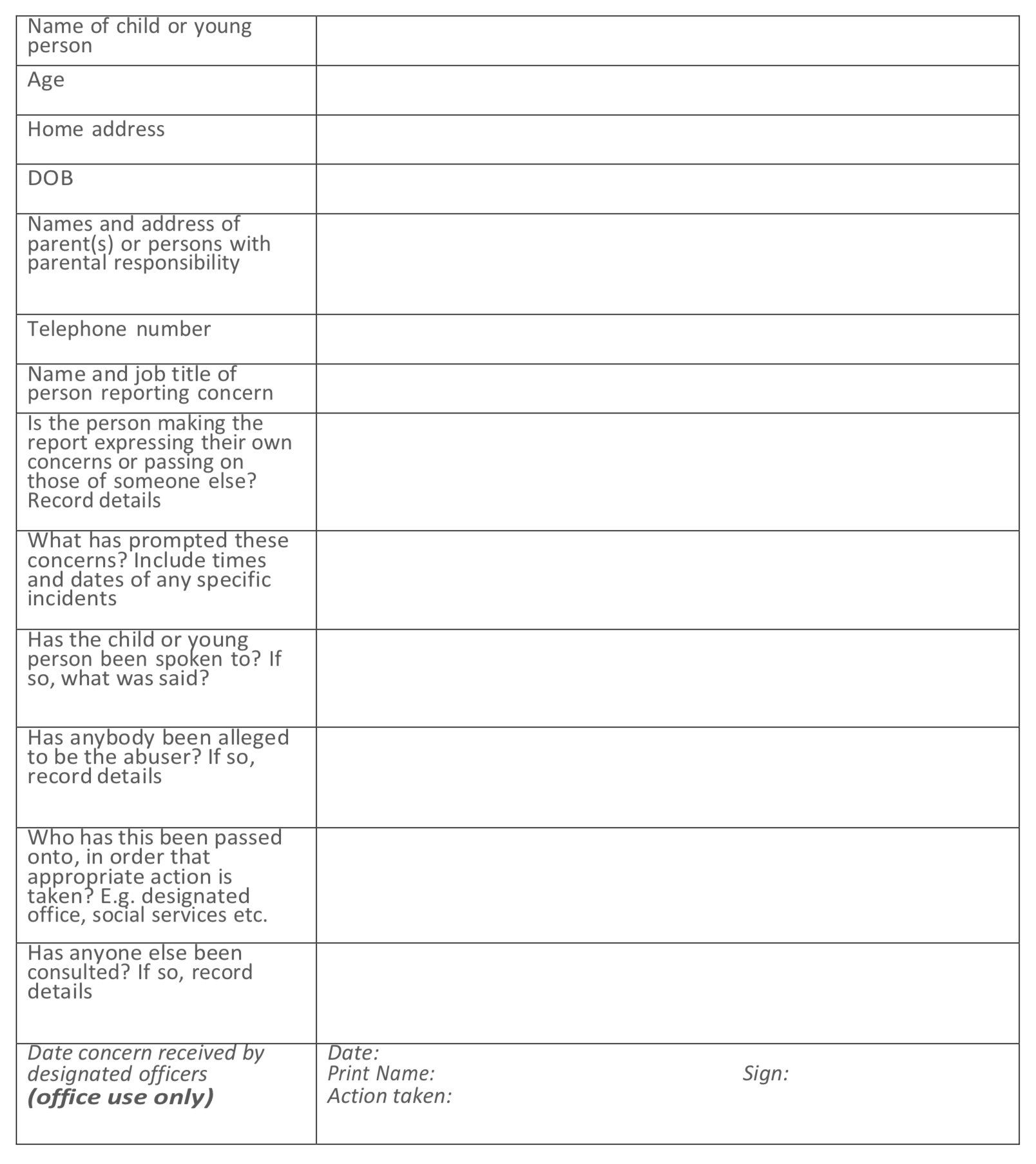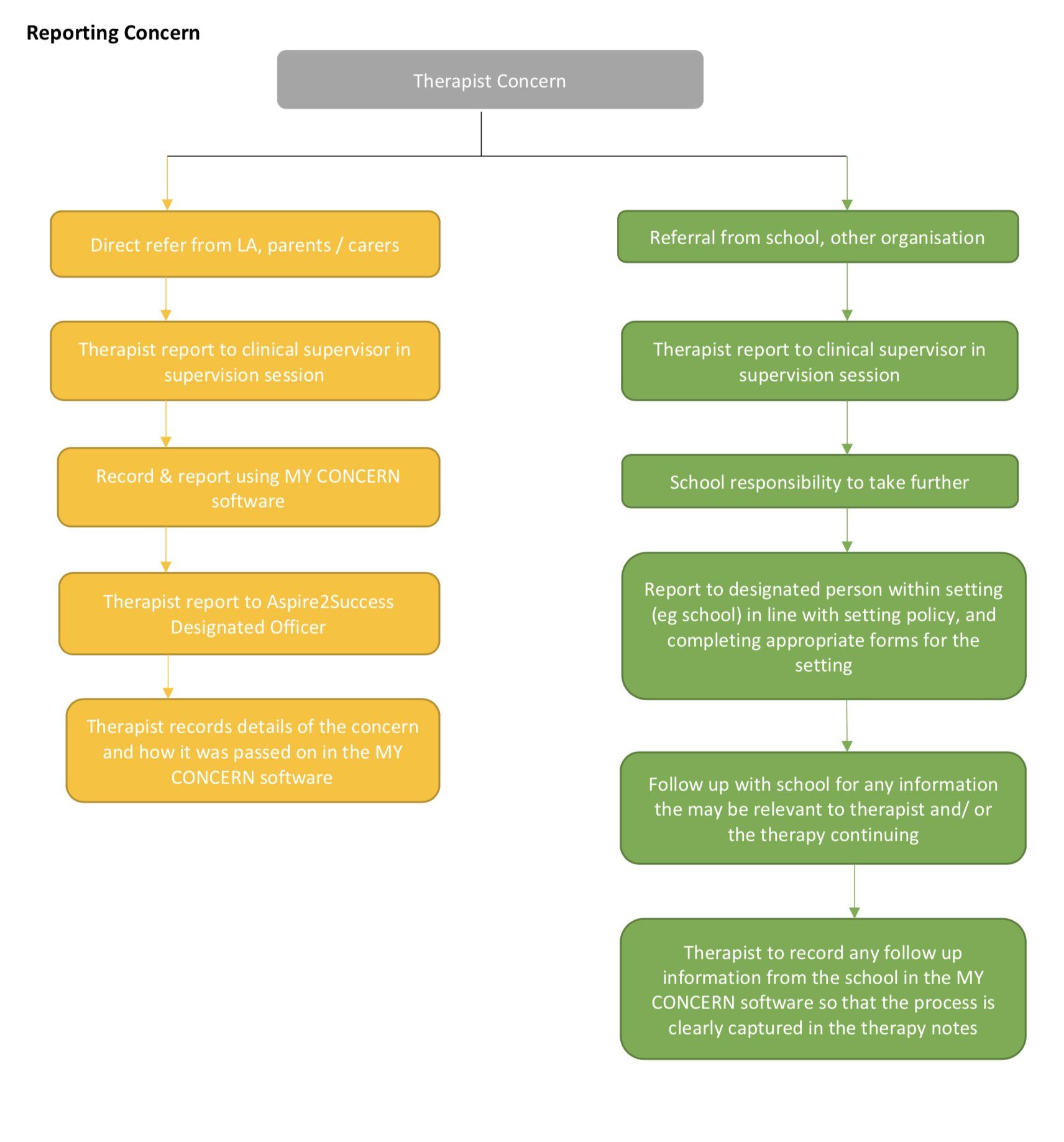Safeguarding Policy
At Aspire 2 Success, we are committed to a practise which protects children from harm. Staff and volunteers in this organisation accept and recognise our responsibilities to develop awareness of issues, which cause children, and young people harm.
We will endeavour to safeguard children and young people by –
- Adopting child protection guidelines through a code of behaviour for staff and volunteers
- Sharing information about child protection and good practise with children, parents, staff and volunteers
- Sharing information about concerns with agencies who need to know and involving parents and children
- appropriately in accordance with our ethical principles of confidentiality.
- Following Safer Recruitment procedures for the recruitment and selection of staff and volunteers.
- Providing effective management for staff and volunteers through supervision, support and training.
- We are committed to reviewing our policy and good practise at regular intervals.
Code of Behaviour Statement of Intent
It is the policy of Aspire 2 Success to safeguard the welfare of all children and young people by protecting them from all forms of abuse including physical, emotional and sexual harm.
This organisation is committed to creating a safe environment in which young people can feel comfortable and secure while engaged in any Aspire 2 Success activities. Personnel should at all times show respect andunderstanding for individual’s rights, safety and welfare and conduct themselves in a way that reflects the ethos and principles of Aspire 2 Success.
Guidelines for all Aspire 2 Success Staff and Volunteers Attitudes
Staff and volunteers should be committed to
- Treating children and young people with respect and dignity
- Always listening to what a child or young person is saying
- Valuing each child and young person
Recognising the unique contribution each individual can make By Example
- Staff and volunteers should endeavour to
- Provide an example that we wish others to follow
- Use appropriate language with children and young people
- Respect a young person’s right to privacy
Physical Contact
Staff and volunteers should never
- Engage in sexually provocative or rough physical games, including horseplay
- Do things of a personal nature that a child or young person can do for themselves
- Allow, or engage in, inappropriate touching of any kind (see touch policy)
General
Safeguarding & Child Protection Policy Updated and reviewed: August 2021
Staff and volunteers should
- Be aware that someone might misinterpret our actions no matter how well intentioned
- Never draw any conclusions about others without checking the facts
- Never exaggerate or trivialise child abuse issues
Sharing Information about Child Protection and Good Practice with Children, Staff and Volunteers
Good communication is essential in any organisation. At Aspire 2 Success, every effort will be made to assure that should individuals have concerns they will be listened to and taken seriously.
It is the responsibility of the management to ensure that information is available to and exchanged between all those involved in this organisation and its activities.
Some information is confidential and should only be shared on a strictly need to know basis.
Children and Young People
Children and young people have the right to information, especially any information that could make life safer and better for them. Aspire 2 Success will act to ensure they have information on how and with whom they can share their concerns, complaints and anxieties.
When sharing information, Aspire 2 Success will be sensitive to the level of understanding and maturity, as well as the level of responsibility of the people with whom they are sharing.
Parents
Parents / persons with parental responsibility are ultimately responsible for their children’s welfare at all times andthey should be assured that their children are involved with a credible organisation.
We achieve this by:
- Publicising information about all our work
- Publishing the names of Designated Child Protection Person(s) and how to make a complaint on our website www.aspire2success.org.uk
- Publishing a full copy of our Child Protection Policy on our websitewww.aspire2success.org.uk
Staff and Volunteers
As an organisation which offers support and guidance to children and young people it is imperative that each member of the Aspire 2 Success staff is aware of their responsibilities under the Child Protection legislation and has a working knowledge of Aspire 2 Success’s procedures. Each member of the therapy team is required to have up to date Specialist Safeguarding training through the Northamptonshire Safeguarding Children’s Board (NSCP)
Recognising Cultural Diversity in Safeguarding
As a community not for profit organisation we are aware of the cultural diversity of the wider community and work sensitively to address this in relation to safeguarding.
At Aspire 2 Success we ensure we have all the relevant information through our referral process to support us to identify signs of female genital mutilation (FGM), radicalisation, child sexual exploitation (CSE) and forced marriage.
All Aspire 2 Success Educational Psychotherapists/therapists have undertaken Safeguarding training, which
Safeguarding & Child Protection Policy Updated and reviewed: August 2021
Supports them to recognise behaviours that indicate a cause for concern. These behaviours could emotional, verbal or physical/ circumstantial.
We work closely with the school to ensure that any indications for concern are closely monitored.
Other Bodies
A copy of our Child Protection Policy will be made available to any other appropriate body.
Explaining Confidentiality to Children in Play and Creative Arts Therapy Sessions
Aspire 2 Success Therapists regard children’s safety and wellbeing as the most important aspect of the Educational Psychotherapy intervention. As Therapy sessions are confidential, it is important that we are able to explain the boundaries and limits of confidentiality in a way that children understand. This helps to create an atmosphere of trust and safety within the therapeutic relationship.
Aspire 2 Success therapists will explain confidentiality to children in a boundary statement at the beginning of the Educational Psychotherapy intervention, and will repeat this boundary statement at the beginning of each Educational Psychotherapy Therapy session to remind the child.
Example boundary statement:
“I will be coming to school each week to do therapy sessions with you in this room. Where we at the beginning of the session I may ask you to complete some tasks and you will be able to choose some activities after this.
Before we start sessions we need to agree on some rules in order to keep us safe. In our sessions we agree not to hurt each other, the room, or the toys in it. I will remind you of these rules from time to time. I will not talk about what happens in your sessions with anyone else, but you can talk about what happens in here with anyone you like. I will only tell someone what happens in here if you tell me something that makes me worried about you and your safety, in which case I’ll have to talk to Mr Brown (safeguarding office at the school), but I will always tell you first if I need to talk to him about what happened in the session.”
Children may need to be reminded of this boundary statement at different times during the Therapy process. This reminder helps children to feel safe within the sessions and they can predict what will happen if they did choose to disclose any information to their Educational Psychotherapist/Therapist.
Aspire 2 Success Therapists will often use a drawing to show children how communication works around Play and Creative Arts. This diagram helps children to understand that they can talk to their friends, parents, teachers and anyone else that they like about what happens in the Therapy session. It explains to children that the Educational Psychotherapist will only speak to the safeguarding officer about disclosures or concerning situations that happen in the Educational Psychotherapy sessions.
Schools that we work with understand that the Educational Psychotherapy is a confidential process, whereby Aspire 2 Success therapists will share limited information about what takes place in the sessions, but can share wider information about the progress that the child is making in more general terms.
Children who have Educational Psychotherapy need to feel that they are allowed to express themselves in whichever way they choose and that they are free to do so without concerns about who this information might be shared with.
Aspire 2 Success Therapy Ethical Framework and Confidentiality
Safeguarding & Child Protection Policy Updated and reviewed: August 2022 Next Review Date: August 2023
Aspire 2 Success therapists are all individually registered with governing bodies of UKCP and BACP Additionally. Educational Psychotherapists work within a strict ethical framework to inform their way of working.
Notable ethical principles that cover children’s safety and confidentiality of Educational Psychotherapy are the principles of fidelity, autonomy, beneficence and non- maleficence.
How do these principles apply to confidentiality?
Fidelity – honouring the trust placed in the Educational Psychotherapist
Aspire 2 Success therapists adopt this principle and act in accordance with the trust placed in them, regardconfidentiality as an obligation arising from the client’s trust, restrict any disclosure of confidential information about clients to furthering the purpose for which it was originally disclosed.
Autonomy – respect for the child’s right to be self-governing
Aspire 2 Success therapists adopt this principle and protect privacy, protect confidentiality, and normally make disclosures of confidential information conditional on the consent of the client involved (or will inform the client of the intention to disclose confidential information for the purpose of keeping the client safe).
Beneficence – the commitment to promoting the child’s wellbeing
Aspire 2 Success therapists work within the best interest of the client based on professional assessment. This will become paramount when working with clients whose capacity for autonomy is diminished because of immaturity, lack of understanding, extreme distress, serious disturbance or other significant personal constraints.
Non-maleficence – the commitment to avoiding harm to the child
Aspire 2 Success therapists have an ethical responsibility to strive to mitigate any harm caused to a client even when the harm is unavoidable or unintended. This includes being aware of safeguarding issues that might impact upon a child and when the Therapist needs to disclose any concerns that they may have around the welfare of a child.
See Aspire 2 Success Ethical Policy.
Procedure for Reporting Allegations or Suspicions of Abuse (Form 1)
In any case where an allegation is made, or someone involved with Aspire 2 Success has concerns, a record should be made using this form. Details must include, as far as practical:
Designated Child Protection Persons
- Therapists working for Aspire 2 Success in schools/ children’s centre / early years setting will be working under the safeguarding and child protection policy and procedure of the setting (e.g. each individual school will have a different policy and procedure).
- Staff need to be aware of the Designated Person within their setting and to be familiar with the procedure of the setting.
- Staff will be provided with a copy of the Child Protection Policy and Procedure on commencement of employment, or agreement of services with Aspire 2 Success.
- For reasons of confidentiality the only person(s) within Aspire 2 Success who need to know this information are the following Designated Child Protection Person(s)
Ayaz Akhtar (Mr)
Educational Psychotherapist/Director Aspire 2 Success
Tel: 0208 090 403 / 07512768511
Important Numbers
Immediate Concerns about a Child
The Multi-Agency Safeguarding Hub (MASH) is the front door to Children’s Social Care for all child protection and immediate safeguarding concerns. If there is an immediate safeguarding concern, for example:
- A child or young person discloses physical abuse
- If there are signs of physical abuse e.g. injury
- A child or young person discloses sexual abuse
- A child presents as very different/scared to go home anxious and you are aware home could be risky
- You should call the MASH immediately Tel: 0345 050 7666.
- A No Names Consultation should not be used for the above scenarios. Outside office
- hours: Emergency Duty Team: 01604 626398 (Use relevant number if working out of Northamptonshire)
Non-Immediate Concerns about a Child
If you have a concern about a child/family but it is not an immediate safeguarding concern, as described above, then you should look at the Threshold of Needs matrix: https://www.nctrust.co.uk/help-and-protection-for-children/Pages/report-a-concern.aspx This tool is designed to support professionals to make decisions as to whether contact needs to be made with Children’s Services and if so which team.
Early Help Assessment & Team around the Family Advice & Support
The Early Help Team will provide advice and support to professionals on Early Help Assessments (EHA-formerly CAF’s) and Team around the Family (TAFs). They are also responsible for the storage, auditing and feedback to professionals on EHAs and TAFs completed. In Northamptonshire this is an online service https://www.nctrust.co.uk/help- and-protection-for-children/protecting-children-information-for-professionals/Pages/early- help.aspx Therapists working in other regions will familiarize themselves with key contacts before commencing work.
Police: if you think a child is in immediate danger, call the police on 999 NSPCC Helpline: 0800 800 500 (24 hours)
Childline: 0800 1111
Record Keeping Filing System
All records, information and confidential notes should be kept in separate files in a locked drawer or filing cabinet. Only authorised personnel will have access to these files.
Client Record Policy
Aspire 2 Success keep brief notes of all client sessions on our secure encrypted online system. All notes and information related to each client will be securely stored for 3 years in paper form from the end of therapy, at which point all therapy notes will be destroyed (see Data Protection Policy and Data Security and Storage Procedures and Best Practice documents).
Good Practice Advice on Disclosure
- Never guarantee absolute confidentiality, as Child Protection will always have precedence over any other issues.
- Listen to the child rather than question him/her directly. Offer them reassurance without making promises and take what the child says seriously.
- Allow the child to speak without interruption. Accept what is said – it is not your role to question or investigate. Do not overreact.
- Alleviate feelings of guilt and isolation, while passing no judgement.
- Advise you will try to offer support, but that you must pass the information on.
- Explain what we will have to do and whom you will have to tell.
- Record the discussion accurately, as soon as possible after the event. Use the child’s
- words or explanations – do not translate into your own words in case you have misconstrued what the child was trying to say.
- Contact the Aspire 2 Success Designated Officer for advice / guidance.
- Record any discussions / actions taken within 24 hours.
- Therapist should discuss any disclosures in clinical supervision.
Suspicions and Allegations of Harm and Abuse
Children make disclosures in different ways in therapy sessions. This policy document outlines how Aspire 2 Success manage concerns and disclosures of abuse.
A direct disclosure is when a child tells a Aspire 2 Success Therapist that they have been, or are being abused or hurt.
Children may play out scenes of a sensitive nature in their Educational Psychotherapy sessions, through any of the creative mediums available within the therapy room. Aspire 2 Success Therapists do not assume that this type of suggestive play is related to a disclosure – however Therapists are highly vigilant at noticing and recording elements of the play that might raise concerns.
Aspire 2 Success Therapists are required to keep an official record of Therapy sessions. These records outline the date of the session, whether the child attended, what themes arose in the play and how the child presented in the room. These records are not in any way an interpretation of the play and do not make assumptions about what is happening for the child in their lives, unless there is reason to believe that the child might be at risk of harm. In this case, the therapist will record the child’s play in note format to help us build up a picture of what might be going on for the child.
Aspire 2 Success Therapists have a duty of care to record and report suspicions or allegations of abuse by following the guidance set out in this policy.
How Aspire 2 Success supports the investigation process with other agencies and professionals:
- We will work in a cooperative and transparent manner with other organisations and agencies to promote the best interests of the child.
- When our therapists are able, they will attend meetings related to the safety and welfare of the child, in particular if there has been a disclosure made directly to the Aspire 2 Success Therapist
- Aspire 2 Success will remunerate therapists for their time dedicated to supporting child protection issues. The amount of time to be remunerated will be agreed with Aspire 2 Success’s Finance Director.
- Aspire 2 Success will provide additional supervision for their therapists on request when they are working with difficult child protection cases.
- Aspire 2 Success will provide a summary report of Therapy sessions as required by social care, the court or police. This will document a record of the sessions that took place, how the child presented over the course of the Therapy intervention and all concerns that have been noted and escalated over the period.
- Aspire 2 Success only keep factual records about Therapy sessions, including date, whether the child attended the session, what happened in the session, any themes noticed in the play and any factual information that raises concerns for the therapist.
- Therapists do not make interpretations about a child’s play or identify any play as a direct disclosure of harm or abuse. Therapists have a duty to pass on concerns to the school and Aspire 2 Success Designated Safeguarding Leads if they witness any play that may be a cause for concern.
- When a child engages in borderline suggestive play, but the therapist deems it age appropriate or low risk, therapists will keep a written record of what happened and when to build up a picture of what might be happening for the child, without escalating as a Child Protection issue. Over a period of time this may amount to a concern that would then be escalated.
- Our therapists maintain trust within the relationship with the child by making therapeutically sound judgements about what information to pass on in line with Aspire 2 Success ethics policy, and in
consultation with Aspire 2 Success Directors and the Therapists Clinical Supervisor. - Aspire 2 Success Therapists receive a minimum of 1.5 hours’ clinical supervision per month with a suitably qualified supervisor to discuss all cases relating to Aspire 2 Success.
Requests for information relating to Child Protection and/or disclosures is to come directly to Aspire 2 Success Head Office.
To request a summary report as a professional as part of a child protection concern, please contact Ayaz Akhtar directly.
E: ayaz@aspire2success.org.uk T: 0208 090 403 / 07511 768511
Safer Recruitment
- Aspire 2 Success operates employment and supervision procedures that ensure highest priority is given to issues relating to child protection.
- Each member of therapeutic staff working with children is required to undergo a DBS check as part of our recruitment policy, which is refreshed every 3 years (see DBS policy).
- Aspire 2 Success encourages the development of staff and volunteers through its ongoing support, supervision and training.
Induction
- Each new member of staff or volunteer is made familiar with Aspire 2 Success policies and procedures including the Child Protection Policy and Code of Behaviour in their induction to the role.
Appraisal and support
- Each new member of head office staff undergoes 1 month / 3 month and 6-month appraisal.
- All Therapists have a review every 3 months with the Therapeutic Consultant and Service Administrator
- There is an official annual appraisal system for each member of staff.
- Self-employed therapists have termly check-in sessions with the Therapeutic
- Consultant and Service Administrator in the absence of appraisals.
- Aspire 2 Success customer schools are asked to provide feedback on their experience
- of the therapists working in their school.
- Aspire 2 Success have a three-way agreement between therapist, their clinical
- supervisor and CEO to share any important information.
- Aspire 2 Success Therapists are required to have a minimum of 1.5 hours of clinical
- supervision per month for their Aspire 2 Success client.
Training
- All staff are required to have safeguarding training through Northamptonshire Safeguarding Children’s Board. Therapists are required to attend the Advanced Level Safeguarding Children course (3 hours) for those who regularly work one to one with your people or work with particularly vulnerable young people.
- Newly appointed therapists must do the NSCB certificate ‘Introduction to Safeguarding Children’ before they see any children in therapy. We require our Therapists to attend the NSCB Advanced Safeguarding Children course within 2 months of joining Aspire 2 Success.
- Therapists must have refresher training every two years, plus meet their governing body quota for CPD training annually (usually 30 hours of additional training and learning)
